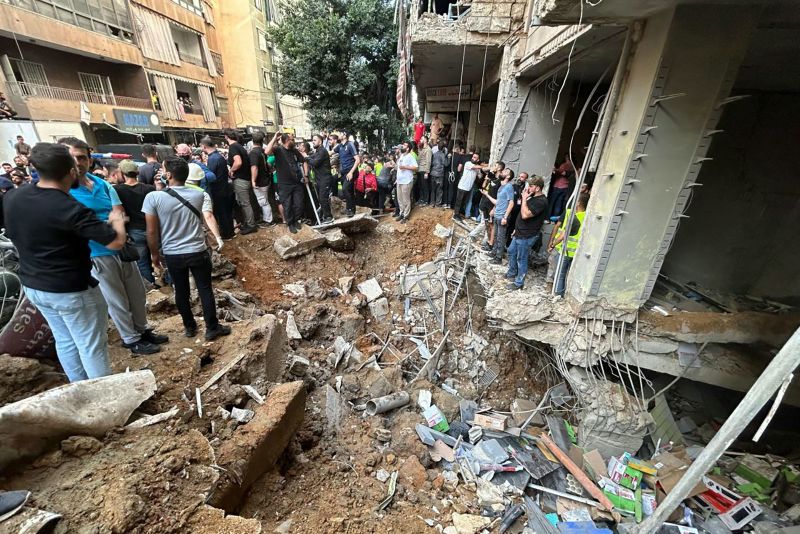Israel’s military claimed it killed a senior Hezbollah commander in an airstrike on the group’s stronghold in southern Beirut on Friday, sharply escalating the conflict between the two sides and raising fears of all-out war.
Ibrahim Aqil, a commander of Hezbollah’s elite Radwan Force, was assassinated along with “about 10” other commanders, Israel Defense Forces (IDF) spokesperson Daniel Hagari said. He accused Aqil and the commanders of planning to raid and occupy communities in Galilee in northern Israel.
Hezbollah has not confirmed the deaths.
Lebanon’s health ministry said at least 12 people were killed and 59 others injured in the airstrike, which leveled a multistory building in a densely populated neighborhood.
According to Hagari, the targeted commanders were “underground underneath a residential building in the heart of the Dahya neighborhood, using civilians as a human shield” at the time of the attack.
Aqil had a $7 million bounty on his head from the United States for his suspected involvement in the 1983 strike on the US Embassy in Beirut, which killed 63 people, as well as the bombing of the Beirut Marine barracks, which killed 241 US personnel later that year.
A week of surprise attacks
Friday’s strike marked the fourth consecutive day of surprise attacks on Beirut and other sites across the country, even as Israeli forces continued deadly strikes and operations in Gaza and the occupied West Bank.
The first major attack against Hezbollah this week came Tuesday afternoon when pagers belonging to the militant groups’ members exploded near-simultaneously. The pagers had been used by Hezbollah to communicate after the group’s leader, Hassan Nasrallah, encouraged members to switch to low-tech devices to prevent more of them from being assassinated.
Almost exactly 24 hours later, Lebanon was rocked by a second wave of explosions, after Hezbollah walkie-talkies detonated in Beirut and the south of the country on Wednesday.
At least 37 people were killed, including some children, and more than 3,000 were injured in the twin attacks.
After initially refusing to comment on Tuesday’s pager explosions, Israel on Wednesday tacitly acknowledged its role in the attacks. Defense Minister Yoav Gallant praised the “excellent achievements” of the IDF, together with the country’s security agency, the Shin Bet, and its intelligence agency Mossad.
Gallant said a “new era” of war was beginning, and on Thursday Israel targeted Beirut for a third time, flying jets and dropping flares over the city while Nasrallah made a speech in which he pledged Israel would face a “reckoning.” Later, Israel launched one of its most intense bombardments against Hezbollah targets in Lebanon in nearly a year of cross–border strikes, saying it hit about 100 Hezbollah rocket launchers.
Friday’s airstrike was the third Israeli airstrike on Beirut since hostilities began last year, after Hamas’ October 7 attack on Israel. In January, an Israeli airstrike killed Saleh Al-Arouri, deputy head of Hamas’ military wing, who had been living in Beirut. In July, a second Israeli strike on Beirut killed Hezbollah’s most senior military official, Fu’ad Shukr.
Before the surprise attacks on Lebanon, Israel’s security cabinet on Monday voted to add a new objective to its ongoing conflict with Hamas and Hezbollah: ensuring the safe return of residents from communities along its northern border with Lebanon to their homes.
After nearly a year of cross-border exchanges between Hezbollah and Israel, tens of thousands of people have been displaced from their homes both in southern Lebanon and northern Israel. While the return of residents of northern Israel has long been understood to be a political necessity for Prime Minister Benjamin Netanyahu’s government, this is the first time it has been made an official war goal.

